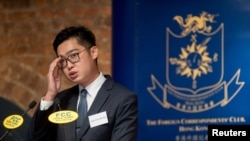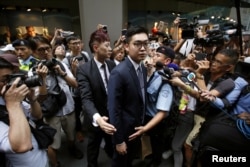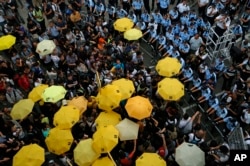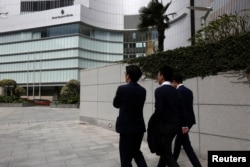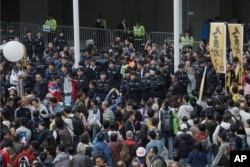Evading surveillance is a new skill for Andy Chan, founder of the Hong Kong National Party, but one he had to learn quickly over the summer.
In July, Chan noticed that he was being followed repeatedly by unidentified individuals. He noticed that once spotted, the snoops would suddenly disappear only to reappear later or be replaced by others.
"You can do some tricks to catch them. For example on the MTR [subway] platform, you wait and just wait and let the MTR pass by and see if anyone stays. Or you get on and off and see if anyone is following on and off," he said.
Chan did not fully realize it at the time, but he was being monitored by Hong Kong’s Security Bureau as part of a two year investigation into his party, which advocates for independence from China.
Hong Kong’s Security Bureau declined to comment for this article. Previously, bureau officials have said that freedom of association and freedom of speech are “not without restrictions.”
While Chan’s party may become the first to be banned by police since Britain returned control of Hong Kong to communist-ruled China in 1997, his story is not uncommon in a city with a longstanding tradition of political surveillance.
Part of life
Historians say surveillance of politically suspect citizens has been a part of life in Hong Kong for much of the last century. From the 1920s, when the colonial government's anti-communist squad shut down newspapers and monitored strike activities to the 1970s when Hong Kong's political life was at its zenith, Hong Kong has been highly watched.
Political surveillance has ebbed and flowed with the times, and observers say it appears to be making a comeback in Hong Kong since pro-democracy Umbrella Movement protests in 2014 mobilized thousands.
Whereas communists and Beijing sympathizers were previously a key target, scrutiny has now shifted to members of the pro-democracy camp. A new cast of characters is also taking part in surveillance as well, and it includes those outside the judicial system.
“Surveillance occurred even before the handover,” said Law Yuk-kai, director Hong Kong Human Rights Monitor, “After the handover, there are people suspected not only from so-called law enforcement agency from Beijing but also from the triads," he said. "There are signs they also use them at the order or instigation of the Chinese authority.”
More active Chinese surveillance
While present during the colonial era, Law said his organization has observed an increase in activity by Chinese intelligence in Hong Kong during important political occasions, such as the visit of top Chinese leaders or major protests on a systematic scale not seen since 1997.
Their work is notoriously hard to prove, but some have succeeded in exposing it. In one well-publicized incident, democratic legislator James To foiled an operation by several Chinese agents who were following him by having them arrested by local police in 2014, according to a Reuters investigation.
Activists also say they suspect Chinese intelligence operatives were behind the 2015 disappearance of five booksellers who traded in banned books and later reappeared in Chinese detention, and the disappearance of Chinese tycoon Xiao Jianhua from a Hong Kong hotel room in 2017.
Surveillance outsourcing
Another noticeable trend, Law said, is the outsourcing of surveillance to either private detectives or triads — the local mafia — which he said is deeply concerning due to the often violent behavior associated with triad members. One example is the case of Eddie Chu, a lawmaker and social activist, who has received death threats with individuals with links to the triads for his attempts to reform rural governance committees.
None of these groups is subject to Hong Kong's oversight rules such as the Interceptions of Communications and Surveillance Ordinance, which requires a judge or magistrate to sign off on surveillance in the home or the use of electronic monitoring.
The ordinance monitors the work of the Hong Kong police but Law said it leaves a large gray area when it comes to private citizens. Following people in public is legal because, Law said, individuals are not protected by privacy laws.
Experts say that leaves most Hong Kong citizens with little recourse.
“Those monitored have complained that the Hong Kong police have done an insufficient job of following up on their reports of being under surveillance," said rights activist and author Kong Tsung-gan, who has followed many of surveillance-related cases, said via social media. "All of these cases suggest a pattern of political surveillance by both Hong Kong authorities and mainland agents, and many in the pro-democracy movement simply assume they are under surveillance and act accordingly,” he said.
Local police routinely film protests, a complaint that is included by non-governmental organizations in their submissions to Hong Kong’s Universal Periodic Review, a regular report on human rights conditions that goes to the United Nations.
Chan is still not entirely certain who was watching him this summer. Like many Hong Kong activists, he appears to accept it as a new part of life.




